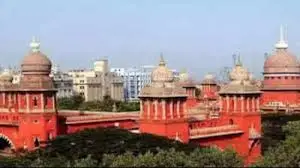Madras High Court stays Tamil Nadu amendments on vice-chancellor appointments

The Madras High Court recently intervened by issuing an interim stay on Tamil Nadu government amendments regarding the appointment of Vice-Chancellors (VCs) in state universities. This decision halted the government’s move to transfer the appointment power from the Governor to the State government. The ruling highlights a key dispute over control and autonomy in higher education governance.
Background of the Amendments
In April 2025, the Tamil Nadu Legislative Assembly passed amendments affecting several university acts. This followed a Supreme Court directive that criticized Governor R.N. Ravi for delaying assent to 12 bills passed by the Assembly. The Supreme Court declared that 10 of these bills had effectively received assent.
Among these changes, the amendments shifted the power to appoint Vice-Chancellors from the Governor to the State government. The new laws also allowed the government to set eligibility criteria for VCs, receive recommendations from newly structured search committees, and remove sitting Vice-Chancellors. These changes marked a major shift in university governance, raising concerns about political interference.
Legal Challenge and Court’s Response
The amendments drew legal challenges soon after. Advocate K. Venkatachalapathy, a BJP leader, filed a Public Interest Litigation (PIL) against the changes. The PIL argued that the amendments violated the University Grants Commission (UGC) Regulations, 2018, which govern VC appointments nationwide.
UGC Regulation 7.3 mandates that search committees recommend candidates to the Governor, who then appoints the Vice-Chancellors. The petitioner claimed that the amendments ignored this procedure, undermining university autonomy and inviting political influence.
The Madras High Court granted an interim stay. This stopped the government from implementing the amendments, preserving the Governor’s power to appoint VCs for now.
Arguments from Both Sides
The Tamil Nadu government, through Advocate-General P.S. Raman and senior advocate P. Wilson, opposed the hearing’s urgency during court vacations. They argued that the amendments did not conflict with Parliamentary laws. The government also questioned the authority of the UGC regulations in this context.
On the other hand, the petitioner stressed that the changes broke constitutional principles by compromising university independence. He warned that direct state control over appointments could politicize universities and harm their academic integrity.
The court’s interim stay reflects its concern about these constitutional and governance issues. It chose to maintain the status quo until a detailed hearing.
Broader Implications: Centre-State Relations and Education Autonomy
This case exposes wider tensions in Indian federalism about control over educational institutions. While education is a concurrent subject, states traditionally manage universities. Governors, appointed by the Centre, act as chancellors and bridge State and Central interests.
The amendments and court stay raise questions about how far a State government can go without breaching constitutional limits or overriding national regulatory frameworks like the UGC’s.
This dispute also highlights political friction. Governors often represent the Union government, creating conflicts when the State government is politically different. This case is a clear example of such power struggles in India’s federal system.
The Importance of University Autonomy
Academic freedom and impartial governance rely heavily on university autonomy. Vice-Chancellors play a vital role in shaping university policies and leadership.
Many experts worry that giving State governments too much power risks politicizing universities. Others believe States need flexibility to appoint leaders aligned with their goals.
The Madras High Court’s intervention shows the judiciary’s role in balancing these competing interests — protecting autonomy while respecting State governance.
What Lies Ahead?
The interim stay is temporary. The court will hold a full hearing to explore constitutional and legal questions. These include federalism, the Governor’s role, UGC regulation authority, and the limits of State power.
Meanwhile, Governors will continue appointing Vice-Chancellors under existing norms. University officials and observers are watching closely because the ruling will affect governance models not just in Tamil Nadu but potentially nationwide.
Conclusion
The Madras High Court’s stay on Tamil Nadu’s VC appointment amendments marks a pivotal moment in educational governance and federal relations. It reinforces that changes to university governance must respect constitutional rules and academic autonomy.
As this legal battle unfolds, it will set important precedents. It will clarify how States can exercise power over universities within India’s federal structure. Policymakers, academics, and constitutional experts will closely study the final outcome, as it shapes the future of higher education in Tamil Nadu and across India.






